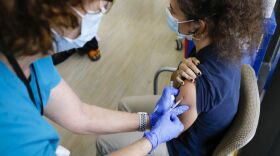
Joe Neel
Joe Neel is NPR's deputy senior supervising editor and a correspondent on the Science Desk.
As a leader of NPR's award-winning health and science team, Neel directs coverage of breaking news in health and science, ranging from disease outbreaks and advances in medical research to debates over health reform and public health.
Joe also plays a key role in overseeing the Science Desk's award-winning enterprise reporting. Among his current projects and responsibilities, Neel supervises the Monday "Your Health" segment on Morning Edition. He also directs several ongoing editorial partnerships. One, a partnership with Kaiser Health News and public radio member stations, focuses on health care in the United States. Another is a polling project on health issues with the Harvard T. H. Chan School of Public Health and the Robert Wood Johnson Foundation.
Neel has played a key role in expanding the network's coverage of global health and development issues. He is currently focused on domestic health issues, including cutting-edge biomedical research and developments in the health industry, such as the Affordable Care Act.
In 2008, he launched NPR's "Your Health" podcast and helped launch and grow "Shots," NPR's health blog, in 2010.
In addition to his responsibilities at NPR's Science Desk, Neel also regularly serves as newsroom manager, overseeing the network's overall news coverage.
During his tenure as editor, NPR's health reporters and correspondents have won numerous awards, including the George Foster Peabody Award, the National Academy of Sciences Communication Award, the Sigma Delta Chi Award from the Society for Professional Journalists, the Everett McKinley Dirksen Award for Distinguished Reporting on Congress, the American Association for the Advancement of Science's Journalism Prize, and the Association of Health Care Journalism award. Neel was awarded the prestigious Kaiser Family Foundation Media Fellowship in 2007.
Neel started filing stories about medicine and health as a freelancer for NPR in 1994 and joined the staff two years later.
He earned bachelor degrees from Washington University in St. Louis in both biology and German literature and language. He also studied biology at the Universitaet Tuebingen in Germany.
-
Abbott says the information that he provided at a press conference two days ago was a recitation of what law enforcement had told him in a room beforehand.
-
So many people caught the omicron variant over the winter that almost 60% of everyone in the U.S. — including most children — now have antibodies to the virus in their blood, the CDC said Tuesday.
-
Many families are under financial stress, parents see kids seriously behind in school, huge rent bills and looming evictions and delayed medical care has negative consequences, to name a few.
-
The CDC information dated Thursday gives new details on this variant of the coronavirus and says the agency should "acknowledge that the war has changed." It was first reported by The Washington Post.
-
The cases have been seen mostly in teens and young adults between 12 and 39 years old. No deaths have been associated with this side effect of the Pfizer and Moderna vaccines.
-
Masks are optional for vaccinated kids, and other recommended restrictions have been softened, making for a more relaxed camping experience for children this summer.
-
In advance of a COVID-19 vaccine being available, a group of independent medical advisers to the Centers for Disease Control and Prevention weighed Friday who should get the vaccine first and how.
-
Health officials once advised going into quarantine and being tested for the coronavirus if you were near an infected person for 15 minutes. Now the rule is a total of 15 minutes in a 24-hour period.
-
A recent NPR poll finds minority communities have been disproportionately burdened by wage gaps and chronic illnesses during the pandemic. Watch a expert discussion at 12 noon ET Wed. Sept. 30.
-
In the largest U.S. cities, at least half of all households have seen a serious financial loss such as lost job, wages or savings. Many problems are concentrated in Black and Latino households.








